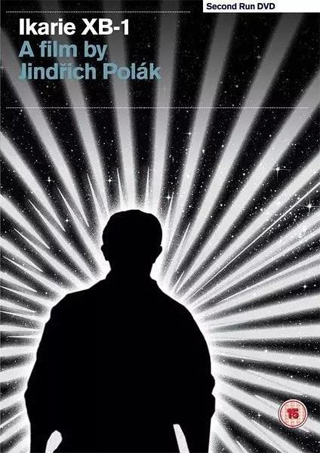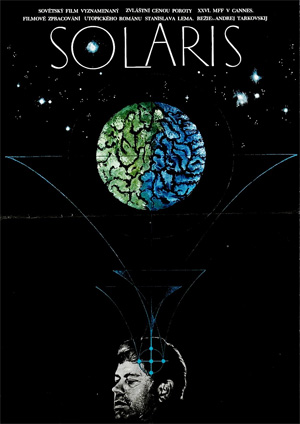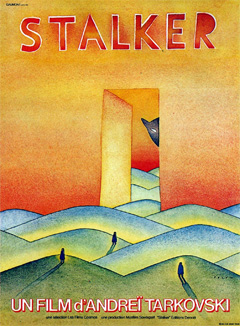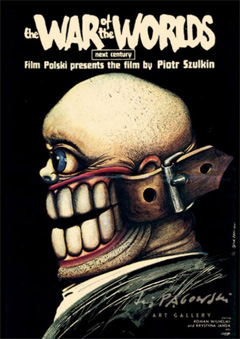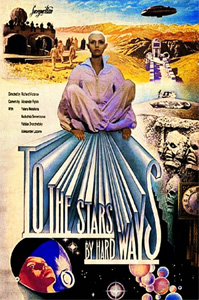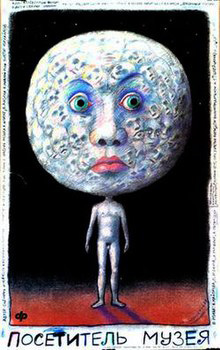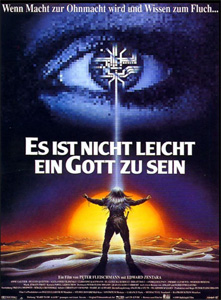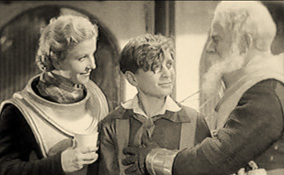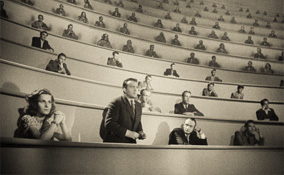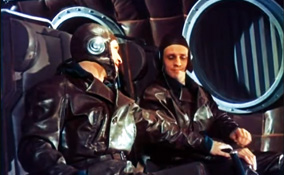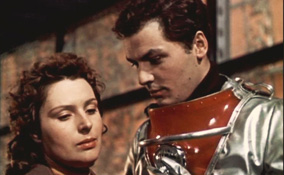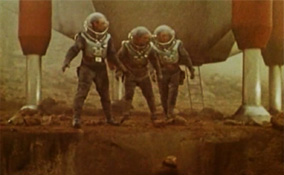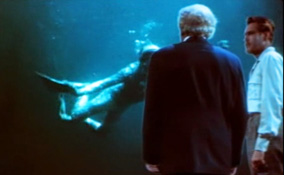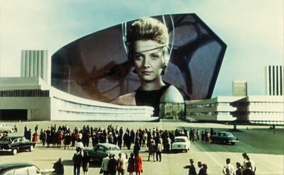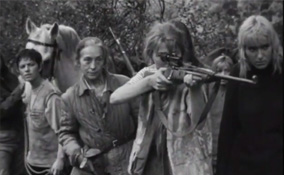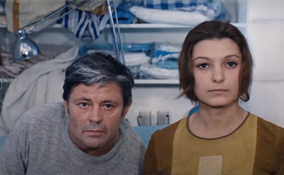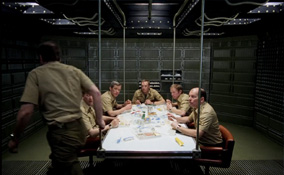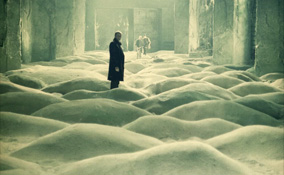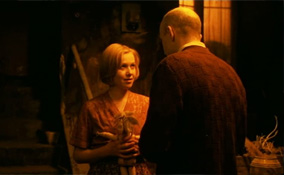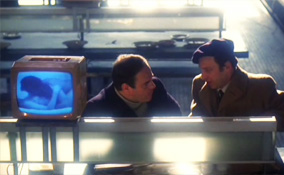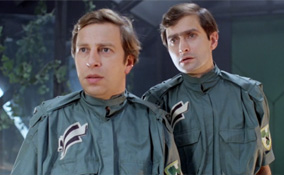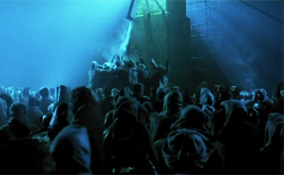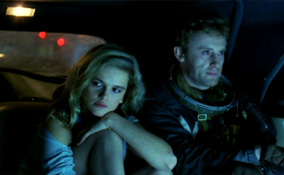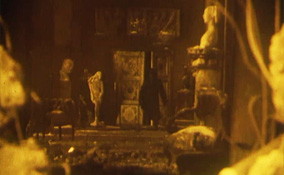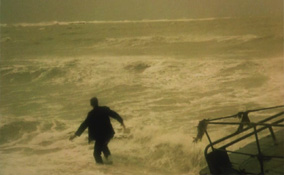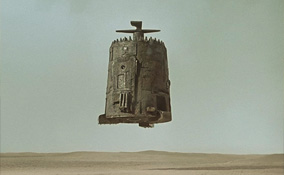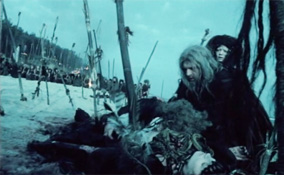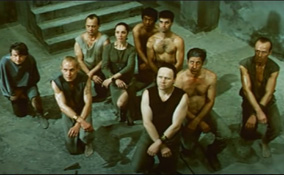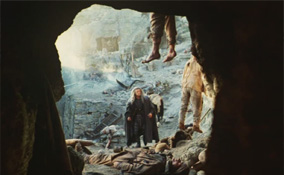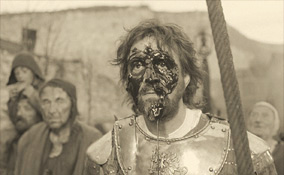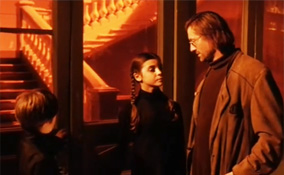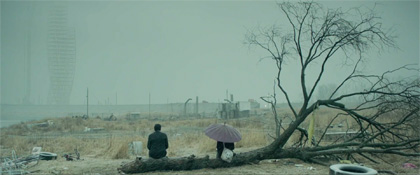<<< II
Notes on science-fiction films from Soviet Union and Eastern Bloc
From high-spirited propaganda to pessimistic metaphors, social satires and philosophical films, Soviet sci-fi established itself to be a unique genre.
The queen of Mars tests new telescope exploring the Earth, and starts obsessing with a Soviet guy. At the same time corruption in communist regime will lead to revolution on Imperial Mars - with a twist. The protagonist successfully exports 1917 October Revolution to another planet in Aelita, the Queen of Mars (1924, Yakov Protazanov)** [watch] which was the first Soviet sci-fi film. This very successful film condemned elites and praised comrades both on Earth and Mars. Its remarkable design might later inspire Fritz Lang's "Metropolis" (1927). Unlikely astronauts - an old man, a woman and a boy - are on a journey to the moon in Cosmic Journey (1936)*** [watch]. This patriotic film is surprisingly accurate predictions on future technologies at the time when no one had ever gone to space. It's way ahead of Hollywood depictions of space travel. The United States detonated two nuclear weapons over the Japanese cities of Hiroshima and Nagasaki on 6 and 9 August 1945, respectively, killed a hundred thousand people. An unknown man found unconscious and was hospitalized while dreaming about his past. In his feverish dream he was a chemist who discovered powerful explosive that has potential to be new atomic bomb. He was cheated by his friend and hunted down by many countries. Adapted from Karel Capek's book, Krakatit (1948, Otakar Vávra)** is unique Czech film in dream-like atmosphere. My problem is that the science part is not very convincing. On 4 October 1957, Sputnik 1 was the first satellite that was launched into an elliptical low Earth orbit by the Soviet Union, and started the Space Race with the US at the beginning of Cold War. Cold War saw 1950s Hollywood boomed with alien-invasion movies. While Soviet cinema focused on space-travel sci-fi that usually have idealistic messages and optimistic endings. Released after the launch of Sputnik 1, Road to the Stars (1957, Pavel Klushantsev)** [watch] is well-made documentary about space travel, aims to inspire audiences to dream further. Its ending impressively resembles footage from future Apollo 11 (1969)! Soviet films were very good about scientific information and predictions. Reckless USA versus wiser USSR on space race to Mars gone wrong. The Sky Calls (1959)* [watch] is propagandistic film with a bit silly plot. It tries to end with being inspiration for next generation in the same manner of Road to the Stars (1957). The Sky Calls was released in USA as Battle Beyond the Sun (1962)* [watch]. Re-edited with new footage by Francis Ford Coppola, this version is even sillier and ridiculous in style of producer Roger Corman by adding a scene with alien look like female sex organ. It shows how obsessive Hollywood was with monsters (and money). On 12 April 1961, Yuri Gagarin became the first human who completed one orbit of Earth, and was awarded Hero of the Soviet Union, his nation's highest honour. Soviet spaceships landed on Venus and found this planet roamed with dinosaurs in Planet of Storms (1962, Pavel Klushantsev)** [watch], a very successful film in USSR. One of main protagonists is a robot named "John", somehow referred to Western capitalist. (The robot design obviously inspired by fantastic American film, Forbidden Planet (1956)) The discovery at the end is fine and it ends with charming nostalgic song about longing to return again, very strange vibe for sci-fi film. Boy meets girl, underwater. Boy in love with girl. Girl in love with boy, on land. They cannot be together. Amphibian Man (1962)** [watch] is tragic love-story combining sci-fi with folklore fantasy, and capitalist villain. Enjoyable escapist film in beautiful production of Crimea, imitating Argentina. Nothing more. Aliens in the planet Centuria heard a Soviet song from Earth. They decided to sent spaceship but it had to land emergency on Mars. Scientists on Earth got SOS signal from Mars and decided to send spaceship there. Encounter in Space (1963)** [watch] is beautiful and imaginative. Good example of Soviet sci-fi from this era. This Czech sci-fi movie, adapted from book of Polish writer, Stanislaw Lem, Icarus XB 1 (1963, Jindrich Polák)*** [watch] is the name of a spaceship in 2163 on a journey to search for life on the planets of Alpha Centauri. Though outdated, this film is still very good. There is a scene they met a spaceship that they thought it belongs to alien, but later when went inside they discovered relicts of human civilization from 1987 Cold War era, this scene predicts 20th century capitalism to fail. Its ending is surprisingly hopeful and optimistic. In post-apocalyptic world, an old woman leads a group of young women hoping to restore human civilization - before all of them turning into animals. Late August at the Hotel Ozone (1967, Jan Schmidt)** [watch] is beautiful and disturbing film from Czechoslovakia, but a bit too short. It was released just one year before Prague Spring, that was followed by Soviet invasion to suppress the reforms. The Americans won the race to land men on the Moon with Apollo 11 on July 20, 1969. +++++++
|
||
From this point onward, Soviet sci-fi films became depressive and pessimistic, and always ended tragically, making this genre unique. Largely thanks to works of three writers: Stanislaw Lem, Arkady Strugatsky and Boris Strugatsky. Their books had huge influences on Soviet and Eastern Bloc's movie directors. Astronaut was accused that he was hallucinated during his mission in space station orbiting an ocean planet called Solaris. A psychologist was sent to investigate but he found his dead wife appearing in the station. Adapted from Stanislaw Lem's book, Andrei Tarkovsky's Solaris (1972)**** [watch] changed the book's theme of optimism in space exploration, by focusing on human relationships instead and turned it into philosophical and spiritual film about life, love and loss. Loneliness and unknowledge of fragile humans in coldness and nothingness of space only emphasize essence of life and richness of Earth, or particularly Russian countryside. This Don Quixote in space left home with ambitions but only found illusions - will he ever return home? [อ่านต่อ]
A group of astronauts followed a signal for help to planet Tem4. They were greeted with a party and treated with psychedelic waves to block their memories. In the Dust of the Stars (1976, Gottfried Kolditz)* is a strange and silly film from East Germany. It's not strange enough to make it a good film, but manages to make a statement about oppressive regime when the protagonists finally found out that the aboriginal people of this planet, who sent the call for help, was enslaved by white-skin aliens. Its tragic ending is quite brave. In a Polish film adapted from Stanislaw Lem's book, Pilot Pirx's Inquest (1979, Marek Piestrak)**, Commander Pirx was chose to lead a group of humans and android robots on a journey to Saturn. It actually was an experiment to evaluate robots' abilities in space, so Pirx wasn't told which of these 5 crews were humans or robots. The intense rose from start since Pirx had prejudices upon robots that they will turn evil eventually. And in the end he is right. This is a good suspense film in space that repeatedly asks - how much human are you? - but if you substitute robots with humans from different cultures or ideologies, this film becomes strongly racist. A police inspector investigates a murder case in small resort located in the Alps with a group of suspicious hotel guests. Dead Mountaineer's Hotel (1979, Grigori Kromanov)** adapted from the Strugatsky brothers' book, this Estonian film is a neo-noir that becomes sci-fi in the end. I do like its twist but the whole movie is not as good as I expected. 'Professor' and 'Writer' hired 'Stalker' to navigate them into the Zone, a mysterious territory created by meteorite 20 years ago. There is a rumour that the Room in the Zone will grant every wish of visitors. Loosely adapted from the Strugatsky brothers' Roadside Picnic (1972), Andrei Tarkovsky's Stalker (1979)**** [watch] is the peak of Soviet sci-fi films. It combines science with supernatural, fantasy, philosophy, spirituality and poetry, and make it to be a simple story yet complicate. I haven't watched it for more than ten years. Watching it again this time still makes my heart skip a beat. Beautiful masterpiece. [อ่านต่อ] Scientists created human-like golem, one of them escaped to live in human world. Polish director, Piotr Szulkin's first film, Golem (1980)** [watch] is very confusing. There is almost no story, just small events go on and on, with some interesting symbols like empty dolls, Frankenstein, plastic surgery and invisible audiences. The story of Piotr Szulkin's follow-up, The War of the Worlds: Next Century (1981)*** happens when the Martians landed in Poland on December 1999. The authorities started controlling people's life and the protagonist, a famous TV news presenter, was forced to announce propaganda about Martians' friendship. This film feels like Nazi-occupied period when everybody lives under fear - and also Soviet-ruled Eastern bloc era. A bit dated but its twist and the ending are very impressive. Who is the bad guy here? The Martians, the Polish authorities or the media? Soviet scientists are the ones try to rescue polluted planet from evil capitalists in To the Stars by Hard Ways (1981, Richard Viktorov)*** [watch]. A humanoid (or artificial human) was found on abandoned spaceship. She was taken to Earth and living with human family. One day her memory started to come back by news of visitation of ambassadors from planet Dessa. This film is very charming and enjoyable. The humanoid even asks existential questions about life. Two men joined scientific experiment in hibernation for three years. When they finally woke up it was longer than they expected. Men were extinct, only women survived. This very successful Polish comedy, Sexmission (1984, Juliusz Machulski)** was supposed to be funny in ultra-patriarchal society, but not now when it would be considered as very sexist. Fortunately its twist ending is very good, it obviously refers to repressive regime that controls people with lies. One year after nuclear war, a thousand survivors live under collapsing dome to avoid radioactive fallout. They believe in a myth that the Ark will come and rescue them. O-Bi, O-Ba: The End of Civilization (1985, Piotr Szulkin)** [watch] describes how this underground society works (or not) in fascinating details. Interesting and challenging but the pessimistic ending is too plain and adds nothing to the story. A prisoner was sent to explore unknown planet alone. He found out that this one looks similar to 1980s earth and learned that every astronaut landed here was called "hero". Ga-ga: Glory to the Heroes (1986, Piotr Szulkin)* is a satirical sci-fi about being a hero (?) - I'm not sure. A very messy story and you can't take any of it seriously. There is a scene the protagonist was asked to sign his name, he wrote Ga-ga - the sound baby makes. On 26 April 1986, there were explosions that ruptured the reactor core in the Chernobyl Nuclear Power Plant, in Ukrainian SSR of the Soviet Union. In Konstantin Lopushanskiy's first film, Dead Man's Letters (1986)***, a Nobel prize scientist is looking for his son in post-nuclear-attack world that happened because of human error. He and a group of intellectuals are living together in a history museum that used as air-tight shelter. They have nothing much to do, just look into each other frailing and dying away. This beautiful-but-pessimistic film in sepia is a farewell to the earth, civilization and humanity - or hopeless situation in authoritarian communist regime. In post-apocalyptic world, a tourist plans to visit a ruin of museum under a sea of chemical waste, the journey will take seven days since the tide starts lowering. He is searching for a mound inside the museum that is rumored to be a portal to another world. With little story, Visitor of a Museum (1989, Konstantin Lopushanskiy)*** [watch] manages to create a very complex world where 40% of population were born with deformed bodies because of pollutions, they were called "degenerates". They live in reservation area and have their own religion, its chanting is "let me out of here". While normal people is anti-religion and called those degenerates monkey. Does despair about the end of the world restore human a faith of God? A thought-provoking film, my favourite Lopushanskiy's, sometimes reminds me of Stalker. Famous cult film, Kin-dza-dza! (1986)*** [watch] is a low-budget sci-fi about two Soviet guys (an arrogant Russian engineer and a Georgian thief) accidentally transported to planet Pluk in galaxy Kin-dza-dza, where they're struggling in its strickly hierarchical system while trying to get back home. Here, Earth represents a bit freer Soviet state in glasnost period while Pluk is barbarian society under authoritarian. Very imaginative satire. This film's structure somehow vaguely resembles four-parts of Gulliver's Travels. Aleksandr Sokurov's Days of Eclipse (1988)** depicts random events in life of a beautiful Soviet guy in Central Asia without solid storyline. I had to look for its source, A Billion Years Before the End of the World by the Strugatsky brothers, it tells story of an astrophysicist working on his groundbreaking thesis but was interrupted by several mysterious events as if they were preventing him from discovering secrets of universe. The film was loosely adapted, it's slow and obviously homoerotic. Its satisfying ending concludes like: living precious life is more important than scientific progress - hence the book's title. A spaceship crash-landed on a distant planet that had Earth-like atmosphere. The group of male and female astronauts kept waiting for rescue ship from Earth to come. As time went by, their descendants formed a society resembling primitive South American tribes while original astronauts became gods of this world. Polish director Andrzej Zulawski's On the Silver Globe (1988)*** is part-spectacular, part-silly, mostly-incomprehensible, mainly because this film wasn't completely finished. It was halted production by the Polish ministry of culture in 1978 and released after independence of Poland in 1988. Many generations already passed when another spaceship landed on this planet. The newly arrived astronauts gradually lost sense of rationality and became new gods of this world that also descent from Earth. The story finally resembles some part of history on our Earth. Very unique film but that historical event is too obvious and forced, it makes this whole spectacular film falls flat and unimaginative. I wish it ended differently, though I know that's the point of the film. Ultra-low-budget film from Czechoslovakia, Masseba (1989)* [watch] tells story of survivors(?) forming a tribe in a rundown building. It begins with sexual tension, jealousy and then coup upon coup. The rapid montage of images of pig head reminds me of William Golding's Lord of the Flies. Unreasonable at all but it might be an allegory tale that I don't get. Masseba ends when its protagonists finally get out of the building and return to nature, naked, as Adam and Eve. What if Renaissance never happened, and the world stuck in the Middle Ages forever. That is main concept of the Strugatsky brothers' book, Hard to Be a God (1964). When human discovered this barbaric planet, they sent some officers to guide and encourage people on this world to develop and civilize themselves - but always be interrupted by human stupidity and ignorance - hence the book's title. There are two film versions of this book. The first one is West Germany produced Hard to Be a God (1989, Peter Fleischmann)*** [watch]. I quite enjoyed this cross-genre film between medieval sword-and-sandal and sci-fi. It's easy to understand its storyline (comparing to more artsy second-version) and so made me think more and further (while on another film you mostly spend time trying to decipher the plot). This film also contains familiar characters like a king/tsar, a Rasputin-like and peasants' uprising. Unfortunately, its end-credit English song called Hard to Be a God is very tacky. Aleksey German's Russian version, Hard to Be a God (2013)*** [watch] is exceptionally beautiful. It over-exaggerates everything to the point that it becomes the most ultra-realistic Middle-Ages ever made on film. But if you don't know its plot before, you will be completely lost in this barbaric world and can never escape - that's the point of this film - to make audiences stuck in nonsensical Middle Ages for 3 hours. Which planet are we on? Are we human on uncivilized planet need to be saved, or alien savior from futuristic earth? Anyway from my Asian point of view, Hard to Be a God is unashamedly Eurocentric. Dissolution of the Soviet Union in 1991 A writer is looking for his daughter in a mysterious school run by mutants. While authorities are preparing to attack the school with chemical weapons to seize the mutants for studying their powers. In The Ugly Swans (2006, Konstantin Lopushanskiy)*** [watch] adapted from the Strugatsky brothers' book, fate of Russian new generation is doomed in every ways. The children stand between authorities and the mutants - do they ever have their own free-will? Comparing to Lopushanskiy's previous works, this film is simple and straightforward. The Strugatsky brothers' Prisoners of Power (1969) tells story of young protagonist from Moscow landed on distant planet governed by Unknown Father that controls people through radio waves. Yes, that is spoiler. It was adapted into two films, Dark Planet (2008, 2009)* [watch part one, two], which are really silly that I couldn't even finish the first part. Though, Boris Strugatsky once said these films are faithfully adapted and the beautiful main actor "is exactly as we imagined him". That still doesn't help a bit.
Under Electric Clouds (2015)*** directed by Aleksey German Jr., son of Aleksey German, is hardly being a sci-fi, except for a few gadgets appearing in the film. This one is self-exploration of Russia's identity crisis in the time of 100 years anniversary of Russian Revolution. Under Electric Clouds consists of seven chapters, but actually six short stories that loosely connect through people, time, dream, a building and Lord of the Rings. Most of them happen from perestroika period to present time to somewhere in near future (2017, I think). While the country is anticipating a war, older generation still holds dear to their legacy and history, younger generation doesn't care or know anything at all, they even believe fake news instead. In the picture above, the protagonists sit on dead tree (old Russia) looking to unfinished building in the mist. The first two chapters are so pretentious and bland that I thought I would hate this film, but it keeps getting better. Still very pretentious but I quite like it. Sometimes reminds me of Theo Angelopoulos' films but not as epic. ++++++++
P.S. Science fiction and fantasy have been part of mainstream Russian literature since the 19th century. Russian fantasy developed from the centuries-old traditions of Slavic mythology and folklore. In the Russian language, fantasy, science fiction, horror and all other related genres are considered a part of a larger umbrella term, fantastika, roughly equivalent to "speculative fiction", and are less divided than in the West. The Russian term for science fiction is nauchnaya fantastika, which can be literally translated as "scientific fantasy" or "scientific speculative fiction". [Wikipedia] P.S.2 I know that sci-fi is a kind of fiction, not a documentary, but it always bothers me when they are not scientifically accurate. When writers or filmmakers create stories they also create worlds. These worlds must be established their own physical laws of nature, most of the time they borrow scientific laws from our real world.
Read further...
Posted: April 2022
<<< II
|
||
 |
||
